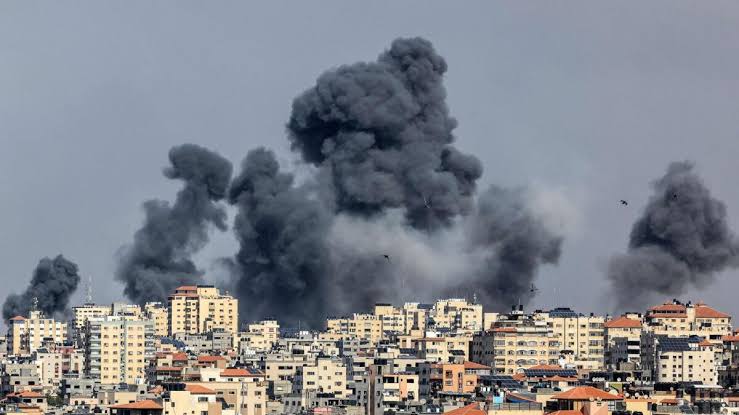Israeli air strikes on residential blocks in south Gaza killed at least 32 Palestinians on Saturday, medics said, after Israel again warned civilians to relocate as it turns to attacking Hamas in the enclave’s south after subduing the north.
Such a move could compel hundreds of thousands of Palestinians who fled south from the Israeli assault on Gaza City to move again, along with residents of Khan Younis, a city of more than 400,000, worsening a dire humanitarian crisis.
“We’re asking people to relocate. I know it’s not easy for many of them, but we don’t want to see civilians caught up in the crossfire,” Mark Regev, an aide to Israeli Prime Minister Benjamin Netanyahu, had said earlier.
Israel vowed to annihilate the Hamas militant group that controls the Gaza Strip after its October 7 rampage into Israel in which its fighters killed 1,200 people and dragged 240 hostages into the enclave, according to Israeli tallies.
Since then, Israel has bombed much of Gaza City, the enclave’s urban core to rubble, ordered the depopulation of the northern half of the narrow strip and displaced around two-thirds of Gaza’s 2.3 million Palestinians.
Gaza health authorities raised their death toll to more than 12,000, 5,000 of them children which added to Israel’s 1,200 brought the total number since the war broke out to 13, 700.
Overnight on Saturday, 26 Palestinians were killed and 23 injured by an air strike on two apartments in a multi-storey block in a busy residential district of Khan Younis, according to health officials.
A statement by the Israeli military on Saturday made no mention of air strike locations. It only said over the past 24 hours its air force hit dozens of Gaza targets including militants, command centres, rocket launch sites and munitions factories.
Israel has said Hamas combatants use residential buildings and districts in densely populated Gaza as cover, something the Islamist movement denies.
Israel had on late last week dropped leaflets over Khan Younis telling residents to move to shelters, suggesting military operations on the ground there was imminent.
Regev said Israeli troops would have to advance into the city to oust Hamas fighters from underground tunnels and bunkers but that no such “enormous infrastructure” existed in less built-up areas to the west, closer to the Mediterranean coast.
Regev said that since western areas were closer to the Rafah border crossing with Egypt, humanitarian aid could be brought in “as quickly as possible”.
At Gaza’s largest hospital, Al Shifa in Gaza City, Israel said its forces had found a vehicle with a large number of weapons and what it called a Hamas tunnel shaft as it combs the complex in search of what it says is the militants’ command centre.
Much to international alarm, Israel has made Al Shifa a primary target of its ground advance, with its military saying that the hospital sits above a vast underground Hamas bunker. Hamas and hospital staff deny that and say Israel’s findings there have so far established no such thing.
The Israeli army said it briefly fought militants outside the hospital earlier this week before entering it to search it and question staff, and there had been no violence inside.
It released a video on Friday that it said showed a tunnel entrance in an outdoor area of the hospital. It appeared the area had been excavated. A bulldozer appeared in the background.
“We are seeing the Hamas presence in all of (Gaza) hospitals. This is a clear-cut presence,” Israeli Major General Yaron Finkelman said in a video showing him conferring with army engineers excavating areas within Al Shifa’s grounds.
On Saturday, Palestinian officials said the Israeli military had ordered the evacuation of all staff and 1,000-1,500 patients from Al Shifa, with evacuees facing treks along dangerous, bombed-out roads littered with dead bodies.
The army denied the accusation, saying it had acceded to a request from Al Shifa’s director to “expand and assist” in more voluntary evacuations via a “secure route”. Doctors and medics could stay to support patients too weak to be evacuated, it said.
Al Shifa staff said a premature baby died at the hospital on Friday, the first baby to die there in the two days since Israeli forces entered. Three had died in the previous days while the hospital was encircled by Israeli forces.
With the war entering its seventh week, there was no sign of a let-up, despite international calls for a ceasefire or at least “humanitarian pauses” to tackle critical shortages of food, medicines, drinking water and fuel afflicting civilians.
Amid warnings that its Gaza siege raised the immediate risk of starvation, Israel on Friday appeared to bow to international pressure in agreeing to allow fuel trucks in and promising “no limitation” on aid requested by the United Nations.
But the United Nations humanitarian agency OCHA said no aid entered Gaza for a third day running on Friday and distributions had come to a virtual halt due to a lack of security guarantees and fuel.
It said raw sewage has begun flowing in the streets in some areas as a result of a lack of fuel to run infrastructure.
Deadly violence has also surged in the Israeli-occupied West Bank since the Gaza war began. At least five militants from the armed wing of Palestinian President Mahmoud Abbas’ Fatah party were killed in an Israeli air strike on a building in the Balata refugee camp in Nablus, Palestinian medics said on Saturday.











